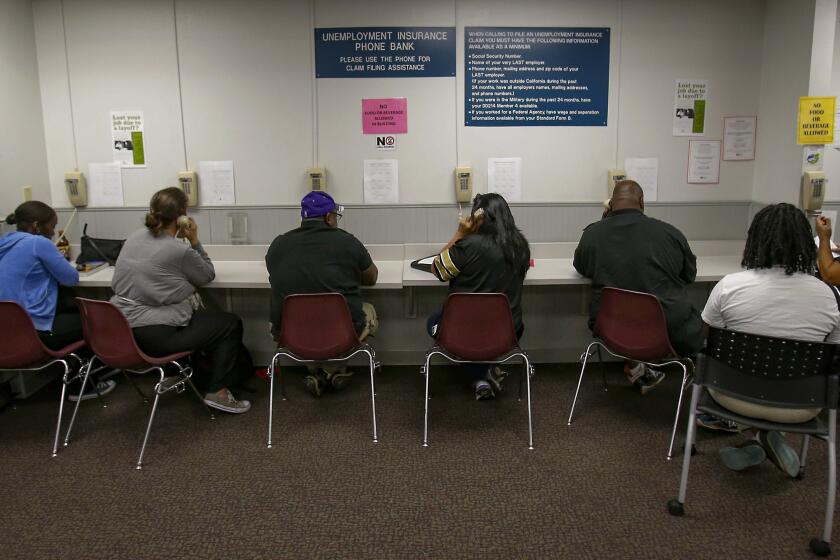Boosting your fees because they can
Cellphone customers gripe about being nickel-and-dimed to death by their wireless service providers. But guess what happens when you put all those nickels and dimes together?
You get a really huge chunk of change.
Since the beginning of the year, the four leading wireless companies -- Verizon, AT&T;, Sprint Nextel and T-Mobile -- have quietly raised a monthly fee that each charges to recoup some of their business costs.
Taken individually, the fee hikes represent pocket change for most people. AT&T;’s fee in California, for example, is up by 40 cents a month; Sprint’s is 24 cents higher.
Combined, however, the wireless companies are looking at hundreds of millions of dollars in additional annual revenue. And that’s with no significant change in their service to customers.
“We call these ‘because they can’ fees,” said Michael Shames, executive director of the Utility Consumers’ Action Network, a San Diego advocacy group. “Every household is struggling right now to pay bills, and these companies put the squeeze on because they can.”
California T-Mobile customers received an insert with their latest bill informing them that the company’s “Regulatory Programs Fee” has risen to $1.21 a month from 86 cents.
The company explained that the fee “is not a tax but a fee we collect and retain to help us recover the costs associated with funding and complying with a variety of government mandates, programs and obligations.”
In other words, T-Mobile is billing customers for its cost of following the government’s rules -- rules that were put in place to make the company friendlier to customers.
Nice.
Better still, T-Mobile said that “these programs and the costs of compliance vary over time, as do the costs that T-Mobile includes.” That’s a nice way of ensuring that customers have no idea what they’re paying for, or why, in any particular month.
A company spokeswoman declined to provide more detail about the rationale for the fee.
T-Mobile is by no means alone in this practice. Virtually every wireless company does it. In May, AT&T; told cellphone customers that it was nearly doubling its “Regulatory Cost Recovery Charge” to 83 cents a month from 43 cents.
A company spokesman told me the increase was based on “an extremely thorough analysis” of AT&T;’s regulatory costs, although he declined to comment on whether those costs had similarly doubled.
A spokeswoman for the California Public Utilities Commission said she was unaware of any significant increase in the regulatory compliance costs of wireless companies operating in the state.
Even so, Verizon Wireless told California customers earlier this month that it was boosting its monthly “Administrative Charge” to 92 cents from 85 cents. Sprint Nextel raised its own administrative charge in January to 99 cents monthly from 75 cents.
Those amounts sound puny -- which is how the phone companies want you to see them. Even the most dubious fee appears more palatable when customers view it as just another handful of coins each month.
But look what happens when you do the math.
AT&T; has about 78 million wireless customers nationwide. An additional 40 cents per customer translates to $31 million a month in extra revenue, or $374 million a year.
But it’s impossible to know exactly how much AT&T; is pulling down. Even though the company says all of its wireless customers experienced a fee hike, it says the amount charged varies from state to state.
A company spokesman declined to say how many customers AT&T; has in each state or to provide a national average for the fee.
“The total is definitely in the hundreds of millions of dollars,” said Denise Mann, who oversees telecom matters for the PUC’s Division of Ratepayer Advocates, the watchdog arm of the state regulatory agency.
“But nobody knows how much exactly each of the companies makes from the fee,” she said. “They deliberately hide the hard numbers. All we know is that it’s a lot of money.”
Wireless companies are permitted by the Federal Communications Commission to pass along some of their business costs in the form of an additional fee. The companies typically depict the fee as a normal part of the regulatory process.
“It’s not,” Mann said. “It’s just a fee they add for their routine business costs because they can get away with it.
“It’s as if you went to the dry cleaner and they charged you $1.50 for a shirt, but then they added another 35 cents for the starch.”
Verizon Wireless has about 87 million customers nationwide. Sprint has about 50 million. T-Mobile about 33 million.
If each of the companies’ customers experienced the same fee hike that California customers have swallowed -- and why wouldn’t they, California cellphone users might wonder -- the total amount of additional money raised annually would top $725 million.
Again, this is just gravy -- a big pile of money atop the even bigger pile of money raised through monthly service fees and other charges.
Is this legal? Apparently so.
Is it an honest way of dealing with customers? Hardly.
“People should write their wireless carriers and ask for a justification of this fee and what the money is used for,” advised Joel Kelsey, telecom policy analyst for Consumers Union.
Will that work?
“It’s a good first step,” Kelsey said.
After that, I’d suggest going a step further. Contact the FCC and ask why this fee isn’t more transparent, and why it’s often such a challenge to decipher our cellphone bills.
The agency’s e-mail address is fccinfo@fcc.gov.
--
David Lazarus’ column runs Wednesdays and Sundays.
Send your tips or feedback to david.lazarus@latimes.com.
--
latimes.com/lazarus/fees
Poll
Do you understand all the fees on your phone bill?
More to Read
Inside the business of entertainment
The Wide Shot brings you news, analysis and insights on everything from streaming wars to production — and what it all means for the future.
You may occasionally receive promotional content from the Los Angeles Times.











